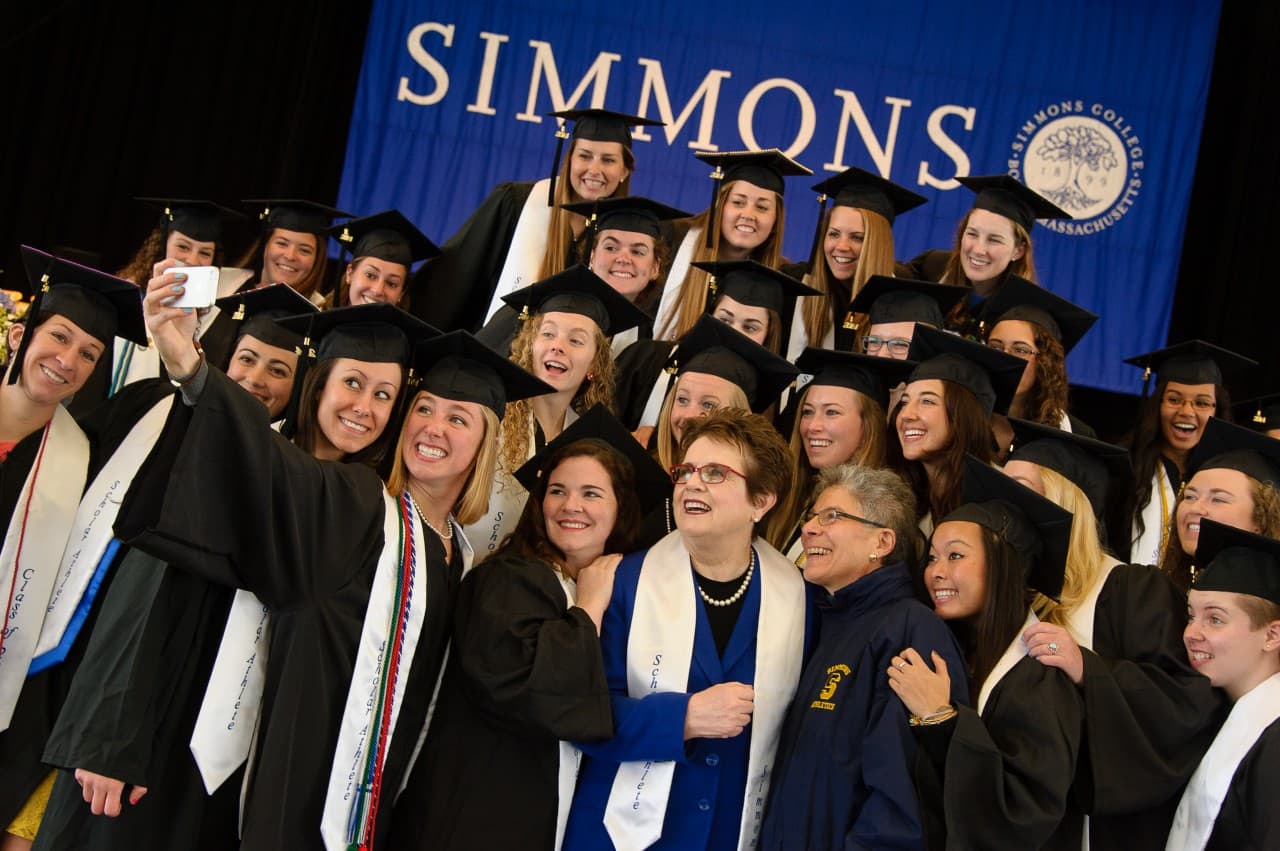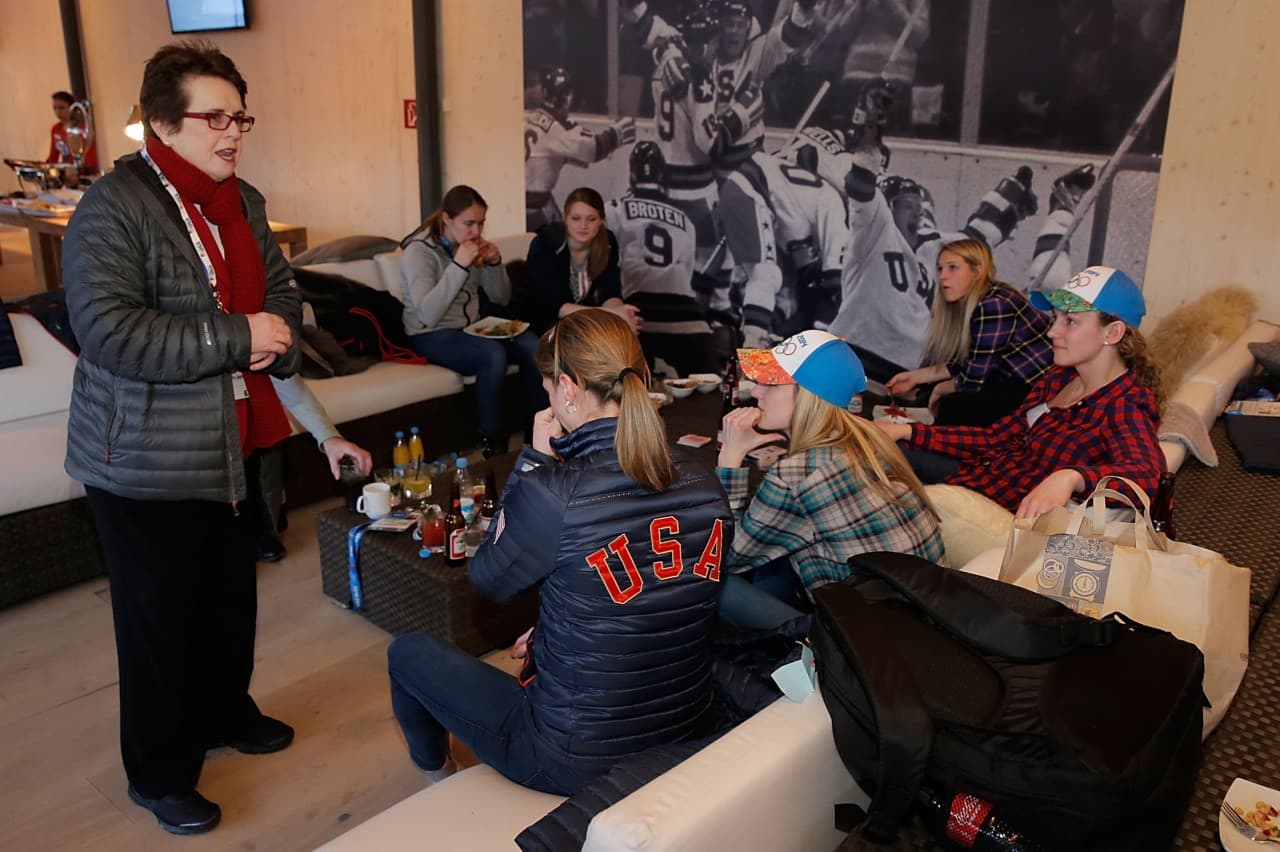Advertisement
Billie Jean King: ‘Fight For Equality And Inclusion For Everyone’
ResumeTennis Hall of Famer and people’s rights champion Billie Jean King was tapped to deliver the commencement address to the all-female undergraduate class of 2014 at Simmons College in Boston. Only A Game’s Karen Given caught up with King and began their conversation by asking Ms. King what she planned to say to the graduates.
This story originally aired on May 10, 2014.
BJK: That's a good question. Sometimes I'll just change a speech. I'll feel the audience and just go. But basically the three things I'll be talking about, the three main things: relationships are everything is number one. And it doesn't have to be in this order necessarily. Keep learning — keep learning how to learn. And also to be a problem solver. I've found those three things, and there's other things, but those were three main things that I've found that people who have inner success as well as outer success. [These] three things seem to be very high in their list and why they do well, I think, in life.
KG: Now are there things you can tell the graduates, and especially female graduates, that you can't imagine a graduation speaker saying to them 40 years ago?

BJK: I don't know — well I didn't hear speakers 40 years ago. But I think one of the things that bothers me a lot with women is, for instance, if I am at a cocktail party and I say "What do you do?" They think I mean sports which I don't. I just want to know do you like theater? Do you like — what do you like? Read, what do you read? But they'll say, "Oh, I'm a terrible athlete," but men never say that to me. And we tend to say "sorry" all the time, and I catch myself always kind of belittling myself a little instead of being positive [and] being confident.
We need more women in leadership positions. You know we're not even at 20 percent in congress; we're at like 19.8 percent or something. It's just phenomenal to think that in the United States of America in 2014 that we're not doing better than that. That we're making 77 cents on the dollar for women. It's just — we really have to change that. Women have to change that but probably more importantly men have to change that. We have to really fight for equality and inclusion of everyone.
KG: Well let's talk about the things you've done to fight for equality for women in sports. Forty years ago you did something that forever changed the way that women are seen in sports. Are there still disappointments about how far we've come since the "Battle of the Sexes?"
BJK: Oh, we're not even scratching the surface. We don't have the opportunities at the professional level. And if you take women's sports, women's high school is exactly where the boys were in 1971 and [1972]. And everybody thinks we've arrived and we're equal and we're not! We have 1.3 million less opportunities in high school than boys. So everyone out there, it's not what you think it is. The perception is much better than it is in reality.

KG: You went to Sochi for the Olympics this year as part of the delegation, and, of course, Russia has anti-gay legislation which was a big deal. Do you feel like your visit meant something to the people of Russia?
BJK: I met some people and I met some LGBT people, and they said it did. But it's only a moment that you're there. I would love to be able to get people out of Russia if they need to get out, gay or otherwise. Oh, it's terrible. I talked with some of the gays. They're bullied every day. If their families are homophobic, they don't have a safe place at home. They don't have a safe place at school. They're not safe. There's so much bullying going on. I met this one boy who said that his family was basically turning against him. He goes to school. They hit him. He's almost been raped.
You know you just speak to one that's dealing with that; there are thousands dealing with that. So because of the anti-gay legislation people have gotten the OK to be bullies and be horrible to us. It was tough. A lot of people in the U.S. thought that we should not go. I think it's better to go and show up — I'm a big believer in that. Just like going to the Middle East when we had the women's tennis championships in Doha. Everybody was calling me — "Why are you going over there with the way the women's laws are?" That's why we need to go over there. We need to be seen. We need to be heard. We need to show there are different ways for both men and women to live their lives and have choices. So I think it's very important to go and not ignore.
KG: What about closer to home? Jason Collins debuted in the NBA this year. Michael Sam might be drafted in the NFL this weekend. Why has it taken so long for these milestones to happen?
BJK: Because we've been scared, and we want to be accepted when we finally come out. And you have to remember the chemistry in a locker room is very fragile. It just is. It's a sensitive place. It's where people are together. They're under stress. They want to win. There's a certain culture that's been created around it. And for men it's the macho culture. That's the epitome especially [in] football.
It's very important that the straight athletes support the gays because they have the power just in numbers. So we need straight quarterbacks for instance to come out and say "Get over it. They're a team player. As long as they do their job. I don't care how they live their life away from the football field." And that's the way it should be for everyone. One by one — it's been a real grassroots movement, the LGBT movement. One by one coming out to your mom, your dad, to a friend. See you've got to feel safe. That's the major thing. Accepted and safe. And if you don't feel like you're going to be safe, it's very hard to come out.
This segment aired on December 27, 2014.
